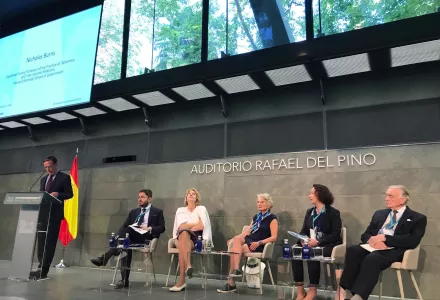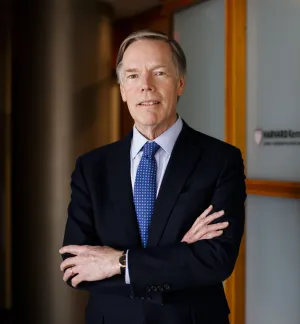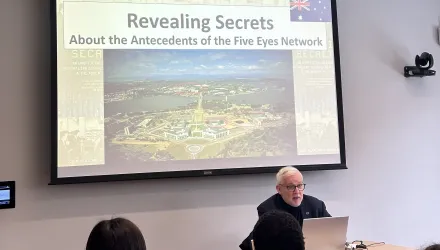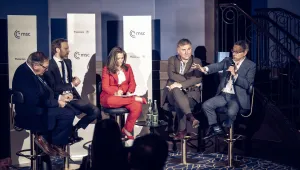
The Transatlantic Relationship in Crisis
Ambassador (ret.) Nicholas Burns
July 6, 2018
Madrid, Spain
Buenos tardes. Es placer estar aquí.
Ladies and Gentlemen, I am delighted to be with you today in Madrid. But, one of the great failings of my life is that I’ve not yet learned Spanish. For your sake and mine, I will thus continue in English!
There are so many people to thank for this conference sponsored by the IE School of International Relations, the Rafael del Pino Foundation and Harvard University’s Kennedy School of Government.
First, we from Harvard are grateful to Maria del Pino for her friendship and extraordinary support for this first ever conference between us in Madrid and Segovia. The foundation’s director Vicente Montes and Waya Quiviger were indispensable partners.
We would also like to thank Diego del Alcazar of the IE Business School and our very good friend and close collaborator, Dean Manuel Muniz.
We value very much the presence today of Carlos Espinoza of the government of Spain.
Manuel and I could not have organized today’s conference without our strong leadership team that included the two Germans—Cathryn Cluver Ashbrook and Karl Kaiser—who neither flagged nor failed unlike the German National Football team in the World Cup!
This conference also coincides with the launch of a new program on Europe and the Transatlantic Relationship at Harvard’s Kennedy School that we launched in April.
We started this program because we believe that many American universities, including our own, have paid insufficient attention to Europe in recent years. Given the vital link we share with Europe, our aim is to train a new generation of Atlanticists at the Kennedy School, to expand teaching and research on Europe—which is, after all, our largest trade partner, the largest investor in our economy and the largest number of American treaty allies anywhere in the world.
When we tentatively set the title for this conference six months ago—The Transatlantic Relationship in Crisis—I wondered if it was an exaggeration.
Six months later, it is a sad but accurate description of an alliance that is experiencing its greatest crisis in many decades. When a failed G-7 Summit in Quebec was followed by a blistering, crude and offensive rhetorical attack by an American President against the Canadian Prime Minister, you know things have descended to bizarre and previously unknown levels of mistrust.
This isn’t the first severe transatlantic dispute and it won’t be the last. During the Suez Crisis in 1956, the Euromissile disputes of the early 1980s and the Iraq War in 2003, we divided on serious issues. But we did not doubt each others’ commitment to the democratic basis of our alliance.
That is what is different this time. After visiting four European countries during the last two weeks, it is obvious a significant breach is opening in the Atlantic Alliance—a breach of values. A breach of how democracies should work together. A breach of trust.
During the next three days in Madrid and Segovia, we will grapple with two crises that are at the heart of our transatlantic differences—the Crisis of Leadership in the United States and the Crisis of Democracy in Europe.
The first crisis is about what has happened to my country since the election of Donald Trump as President.
He has launched a radical revolution in American foreign policy that is dangerous for the USA and for the world. Specifically, he is undermining four critical foundations of American strategy over the last seventy years.
First, he views the European Union as a strategic competitor rather than the strategic partner all other American Presidents have valued. He seems to judge the EU only on the issue of trade balances and ignores all the vital work we do together—on climate change, development, pandemics, counter terrorism, cyber and many other issues.
He is, at best, ambivalent about NATO. But in recent weeks, he has disparaged NATO in public rallies describing it as a cost center that bleeds us dry. No mention of all NATO has done in Afghanistan, in the Balkans and in the Middle East in the fight against the Islamic State.
Second, he has disavowed many of the multilateral trade regimes vital to the global economy—TPP and the Transatlantic Trade and Investment Treaty with the EU. He is threatening to dismantle NAFTA. He suggests no alternatives for the world to consider in their place.
Third, during the most terrible humanitarian crisis since 1945—over 63 million refugees and displaced people are suffering today—the U.S. is slashing our acceptance of immigrants and banning citizens of several Moslem majority countries from being accepted as refugees.
And, fourth, he has embraced authoritarian leaders in Hungary, Poland and Italy while openly seeking to undermine, in the very first twitter attack in history by an American President against an allied leader, German Chancellor Angela Merkel at a time of difficulty inside her governing coalition.
This is an American crisis which we Americans need to address during our upcoming elections in November 2018 and November 2020.
The outcome of the American crisis really matters. Our NATO Alliance with Europe and Canada is our most important in the world.
And on the economic front, 45 of 50 U.S. states export more to Europe than to China. More than 4 million Americans work in the U.S. for European companies. We are symbiotically linked—the two largest global economies, the heart of the democratic world and of the West.
It is a beautiful relationship. But it is not and never will be perfect. We will always have our disagreements and fights. Churchill, always so wise about such matters said it best: “The only thing worse than fighting with allies”, he maintained, “is fighting without them.”
The second issue to debate this weekend, of course, is the Crisis of Democracy here in Europe. As we Americans live in a fragile glass house, you will get few lectures from us. We have our own democratic crisis to contend with.
But, those of us who admire the European Union and the democratic foundation of modern Europe are deeply concerned by the multiple challenges you face from Brexit to terrorist threats to the migration debate to Putin preying on the borders of his European neighbors.
And we know that many Europeans are consumed these days by an even deeper existential crisis—the rise of anti-democratic populists in Hungary and Poland, inside the government of Italy and in the German Bundestag itself.
To watch as Viktor Orban challenges press and academic freedoms and the Polish government initiates a power struggle with its Supreme Court this week is to worry about the integrity of formerly democratic societies. With the current German government weakening, with the Dutch government’s one vote majority, with the UK leaving Europe, much rests on the shoulders of the French and Spanish governments to keep democracy strong inside the EU and it Europe itself.
A final thought. The West must survive these many attempts to undermine it.
As Canadian Foreign Minister Chrystia Freeland, said a few weeks ago in Washington, we must “strike back” to defend our democratic alliance on both sides of the Atlantic.
I am confident that Donald Trump cannot kill NATO. He cannot kill the U.S.-European Union partnership. They are too strong to be killed. And too many Americans continue to support them.
So that we might have some hope today about our common future, let me close with the words of another American President, John F. Kennedy. Here is what he said about Europe 56 years ago this week:
“We do not regard a strong and united Europe as a rival but as a partner. To aid its progress has been the basic object of our foreign policy.”
May it ever be so.
Thank you. Muchos Gracias!
Burns, Nicholas. “The Transatlantic Relationship in Crisis.” July 6, 2018




